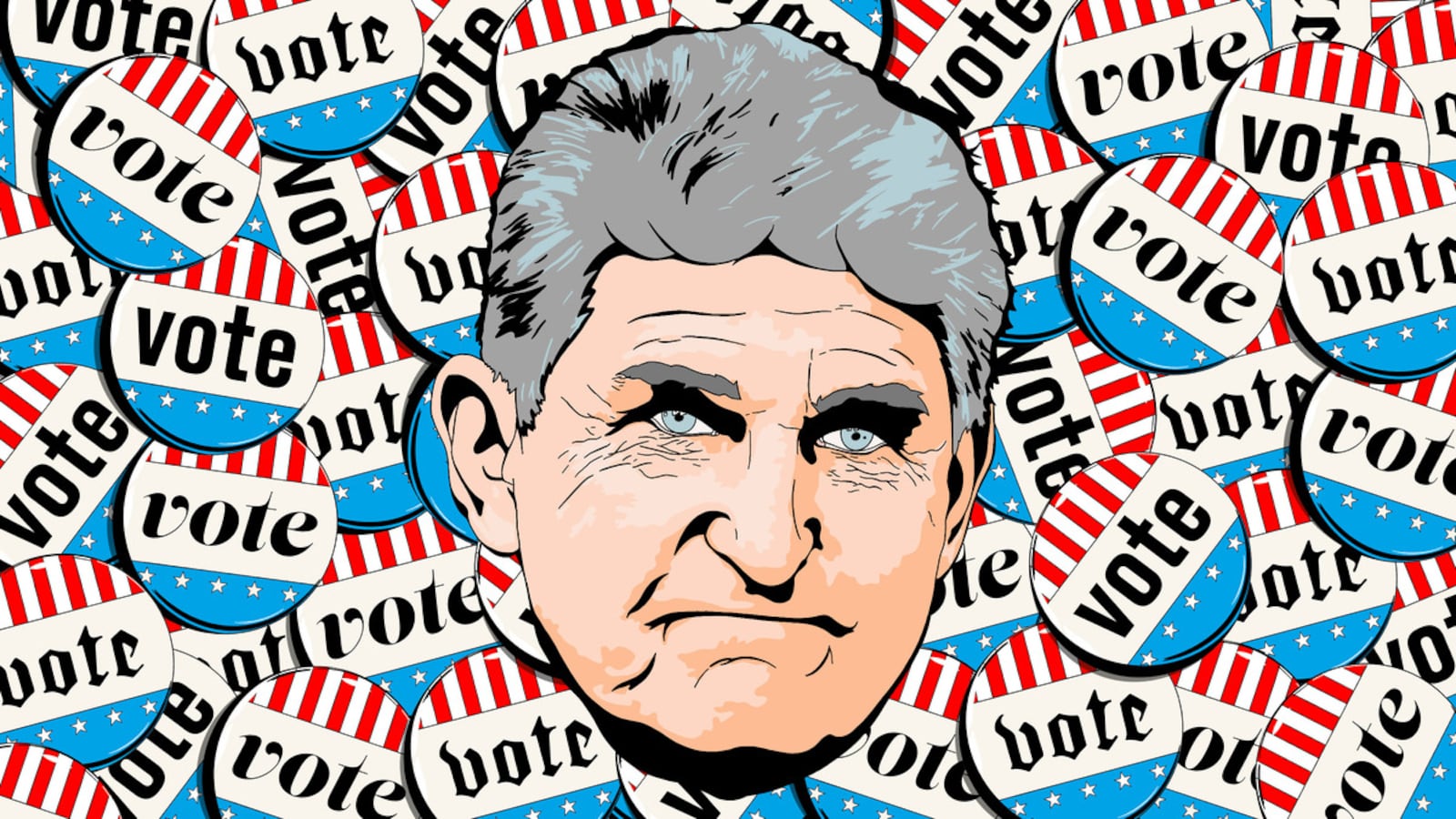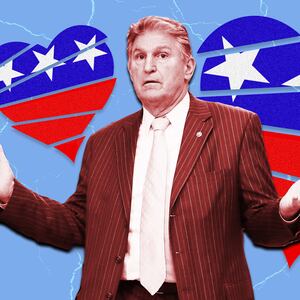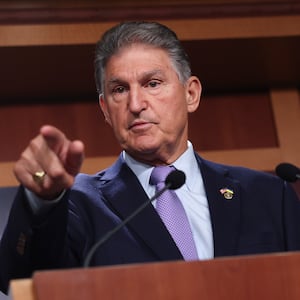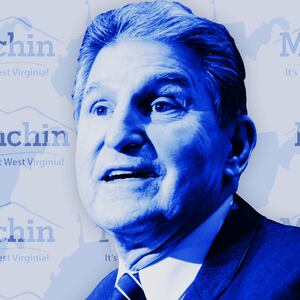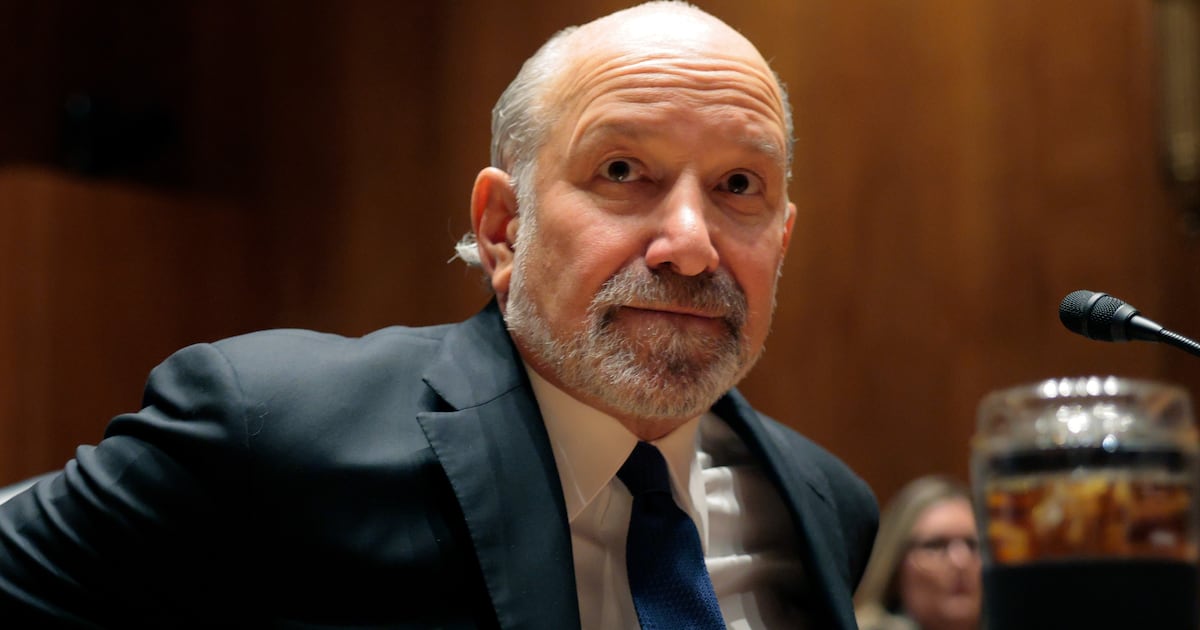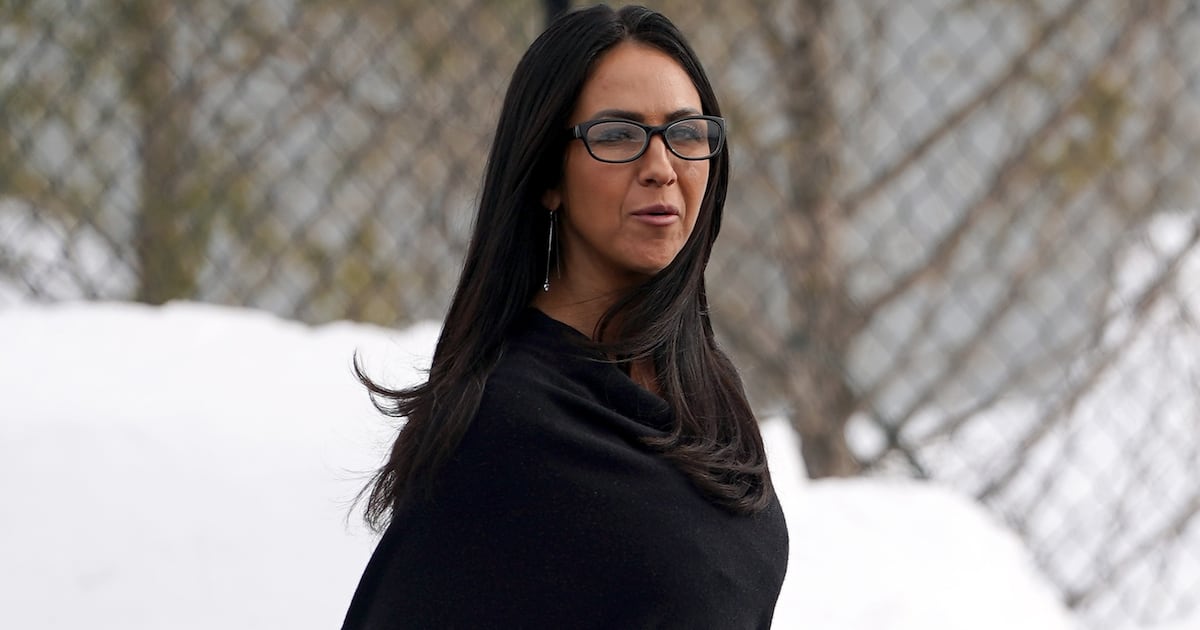For the last two years, whenever Sen. Joe Manchin opened his mouth, many Democrats got ready to wince—it usually meant he was about to dismiss or pump the brakes on one of the party’s agenda items.
But now, Democrats are anxious for the word from Manchin on something else entirely: whether he’ll run for re-election in 2024.
Although the West Virginia Democrat has driven many in his party crazy, it’s a near-certainty that, without Manchin, Democrats will be even more hard-pressed to hold his Senate seat. The reflexively centrist, battle-tested senator is likely the only Democrat with a real chance to win in the ever-redder West Virginia.
Top senators have publicly urged Manchin to run for another term; donors and Democratic fixtures in D.C. are pining for him to take a go at it, too.
True to form, the senator may keep them squirming.
Publicly, Manchin has said he hasn’t made up his mind about running again, insisting earlier this month he will make the call “on my own time.” That’s what he did for his most recent campaign, in 2018, when he didn’t announce his re-election campaign until January of that year. Many Senate hopefuls routinely launch their bids closer to two years before Election Day. Manchin filed his paperwork as late as he possibly could.
Jonathan Kott, a former top aide to Manchin who staffed his 2018 campaign, said the senator “doesn’t look at election cycles like other politicians.”
“He’ll talk to West Virginians and his family and make up his mind next year,” Kott said. “He’s focused on governing, not campaigning. That’s how he handled it in 2018.”
In West Virginia, guessing what the senator might do is a subject of frequent discussion. There seems to be a belief that there’s an equal chance he runs for re-election, runs for governor, or retires for good after spending decades in office.
Some in D.C. have a hard time seeing Manchin run, believing he may choose to “go out on top” after shaping Democratic priorities for four years, as one insider put it, rather than end his long career with a defeat.
Notably, some framed the decision in terms of him not ruling a campaign out. “I think he’s still interested in running for re-election in 2024,” said Mike Plante, a longtime Democratic strategist in West Virginia.
Anxious Democrats have looked for tea leaves in Manchin’s recent moves. Bill Gates’ visit to the state earlier this month, on Manchin’s invitation, was noted by Washington and West Virginia insiders—as was the recent departure of his chief of staff, which is sometimes a harbinger of a retirement announcement.
At the same time, Manchin’s campaign has nearly $10 million in the bank, a strong position to begin the election season.
But West Virginia, once a Democratic stronghold, has only grown redder and more polarized since 2018, when Manchin won by a 3-point margin, the narrowest of his career. Many Democrats survey the landscape and come away convinced the three-term senator and former two-term governor is the only person with a chance of keeping the seat in Democratic hands and giving the party a shot at retaining their 51-seat Senate majority.
“Manchin is tough to beat, even if they do find a good Republican recruit who’s not particularly crazy,” said a Democratic Senate strategist. “The Republicans in the state are smart enough to know this won’t be an easy race after seeing what happened in 2012 and 2018.”
Indeed, competition could be stiff: Gov. Jim Justice, the popular Democrat-turned-Republican governor, is strongly suggesting he will run for Manchin’s seat. At the very least, even if Republicans would be favored to beat Manchin, they would still have to spend considerably to do so, wasting money that could be used against Democrats in battleground states.
The Senate GOP’s campaign arm has already needled Manchin, along with Sens. Jon Tester (D-MT) and Sherrod Brown (D-OH), with an ad campaign taunting them to “retire or get fired.”
For party leadership, the need for Manchin to run is painfully obvious. The strategist predicted that if he doesn’t run, “we’re not going to be playing in this state,” no matter what Democratic campaign organizations might insist.
“With someone like him, I don’t know how much leaning you need to do,” they said. “He knows full well he needs to run again, the caucus needs him to run again.”
Democrats, of course, have grown accustomed to needing things from Manchin. In an evenly split Senate, the senator was routinely the chamber’s swing vote and key rank-and-file player. Frequently, he disappointed Democrats, vocally rejecting the multi-trillion dollar Build Back Better social spending plan and going to the mat for the filibuster rule that Democrats wanted to end so they could enact a number of priorities.
But Manchin has also come through for Democrats, backing the Inflation Reduction Act—which contained historic investments in countering climate change—and routinely supporting Biden’s judicial and administration nominees.
It’s part of the brand Manchin has cultivated over decades in public office: the independent who frustrates both sides. But in 2024, there may not be much appetite for that brand anymore, with an increasingly polarized state finding the longtime centrist increasingly more polarizing.
That might be most true among West Virginia Democrats. If Manchin does run, some party activists say he should be prepared for a primary fight.
Shane Assadzandi, a Democratic organizer and state party official who has long been critical of Manchin, said there are ongoing and active discussions about fielding a candidate to challenge Manchin in a primary.
Assadzandi declined to divulge further details, saying the topic of primarying Manchin is “incredibly sensitive” in West Virginia. He cited a saying from the TV show The Wire: “If you come at the king, you best not miss.”
Whether or not Manchin is challenged, if he runs, Assadzandi claims that fewer Democrats will be enthused about supporting him after the last two years.
“It’s anecdotal, but a lot of the people I’ve fought with for years over Manchin have privately told me, ‘Wow, you’re right, I won’t support him anymore,’” Assadzandi said. “They didn’t care about Brett Kavanaugh, or the way Manchin has been hostile toward progressives. The moment he tread on Biden’s toes, that was it.”
One high-profile move from Manchin has reverberated in West Virginia: his decisive opposition to continuing the expanded Child Tax Credit program, said Seth DiStefano of the nonpartisan West Virginia Center for Budget and Policy.
The monthly payments to qualifying families, which Democrats approved in 2021, was “an extra huge deal in West Virginia,” one of the nation’s poorest states, said DiStefano. Census Bureau data suggested the program contributed to a historic reduction in child poverty.
But in January 2022, with the program up for reauthorization, Manchin said he would not support extending it if lawmakers did not mandate work requirements for recipients. Privately, he reportedly told colleagues that he worried that CTC recipients would use the funds to buy drugs. A year later, the expanded CTC is dead, with no immediate hope for reauthorization.
“Sen. Manchin’s very public pushing has not gone unnoticed,” DiStefano said. “There are substantive reasons why people are really, really upset with him.”
Critics like Assadzandi argue that Manchin is not the only Democrat who could win in West Virginia, even if he is the only one who has in recent years. He argued that recent reporting on the senator’s considerable personal investments in the coal industry—and the steps he took to protect those investments while in office—would make him uniquely vulnerable to GOP attacks over ethics.
“He comes with a lot of baggage,” Assadzandi said.
Manchin’s potential opponent, Justice, has used his coal business—which has faced considerable legal issues—to ingratiate himself with voters in the coal-loving state. Republicans may also choose to instead attack Manchin over the Inflation Reduction Act, which he had an outsized role in writing, and argue that he supported measures to kill the coal and mining industries.
Notably, Manchin has conspicuously embraced his role as a key salesman for the IRA, with Politico recently writing he is “unabashedly proud” of his work on the legislation that Republicans have pilloried.
West Virginia politicos, like Plante, have a hard time seeing Manchin bleed considerable Democratic support if he chooses to run.
“At the end of the day, West Virginians whose politics are more left-of-center realize they have someone they may not agree with all the time—but who, at the end of the day, is going to be voting for Chuck Schumer or a Democrat to be Senate majority leader,” he said. “In some sense, that is the most important vote that matters.”
At 75 years old, Manchin may choose to hang it up and retire at the apex of his influence rather than go down swinging. Some are willing to bet that he will. “It’s going to be an incredibly tough road to hoe for him,” DiStefano said.
Others aren’t convinced, even if they are not sure what exactly Manchin will do.
“He looks like a guy that’s not yet thinking about his legacy,” Plante said. “A guy that’s still trying to build for the future and to make his mark.”

